The following translation from the Japanese-language autobiography entitled Aikido Jinsei (An Aikido Life) by Gozo Shioda Sensei of Yoshinkan Aikido is published with the kind permission of the author and the publisher, Takeuchi Shoten Shinsha. The series began with AIKI NEWS No. 72. Read the eleventh part here.
“When In Trouble Use My Name”
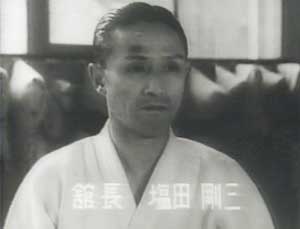
Luck doesn’t hold out forever. It was late September 1941. Above the roof of the villa in which we lived and looked after the Vietnamese, the Rising Sun flag always fluttered in the wind. It was our responsibility to raise the National flag every morning. One day, the Rising Sun was lowered without our knowledge, and in its place the three-colored French flag was flying in the serene sky of Formosa. We didn’t even notice, but a Military Policeman discovered the substitution and cross-examined us. “Who is in charge here?” he demanded, and then took us both to the Military Police Headquarters in Taipei. We were extremely puzzled because the man concerned wouldn’t release us due to an oversight. So I was forced to ask, “May I please use the phone?” I was allowed to do so, and I immediately called Lieutenant General Wachi, Chief of the General Staff at the headquarters of the Japanese troops in Taiwan. Luckily, he was in his office, and I quickly explained how we had come to be detained. “I see. I will contact the local Military Police,” he said, and hung up. A few minutes later the Military Policeman who was holding us approached in a very deliberate manner, as if he had changed into quite another man. “I am very sorry to have held you in custody when you are so busy,” he said to us. “Please forgive us. Now, please leave.” He saw us to the door. On the way back to Hokuto, we were quite bewildered by what had happened. We stopped off at the headquarters and visited General Wachi to express our heartfelt gratitude. He smiled and said, “Whenever you are in trouble, use my name, and your difficult situation will be made easier.” We came home highly encouraged.
In the midst of all these troubles, Ogawa received his draft notice in November of that year. On the night before his return to Japan a grand farewell party was held at the Sarashina restaurant. All the members of the Nagasaki family and Koyanagi-nesan, my geisha friend, joined us. Ogawa and I were loath to part with each other, and partied all night long. Koyanagi-nesan played her favorite tunes for us on her shamisen (three-stringed Japanese banjo), wishing him a happy future. Soon Ogawa left in high spirits. This was the last I saw of him. We, who are not God, could not foresee his destiny. Therefore, I said to him, “Be sure to come home alive.” He replied, “I will never die, even if I am killed.” He waved and smiled. We parted reluctantly, and he returned to our homeland. I was quite dejected at his departure.
Like a bird which has suddenly lost its wings, I lost my taste for life. I spent four or five days in an absent-minded stupor. It was difficult to recover my composure in those hollow days. Gradually, I became absorbed again in the education of the Vietnamese students, but soon the Southern Association reduced the scale of its operations.
With the help of the army, the 13 Vietnamese were able to get positions in the Taiwan Sugar Manufacturing Company, and they disappeared one by one until, before I even realized it, no one was left.
After I felt that my mission had drawn to a close, I was assigned to teach physical education to Taiwanese secondary school students. The new place I was ordered to was a small and nameless village, located halfway between Hokuto and Taipei. The class I was in charge of began after 1:00 p.m., so I had a lot of time before I had to go to school each day. Unfortunately, the villa where I was staying was to be closed up by the end of January, which left me a bit confused. But I figured I would have some idea of what to do when the time to move came, so I didn’t really worry about it. November ended and December came, and I was surprised when, contrary to my expectations, some people actually came to close the villa. Boards were nailed across the gate. The windows and doors were also nailed shut, and all the tatami mats were taken up one by one and hauled away. I asked them to leave one tatami to lay down on, a mosquito net, and one set of bedding, and I asked for permission to stay a little bit longer until I could find another place to live. So I had to take the nails out of a window in order to get in and out. This life of mine was quite to my liking.
Transferred To Formosa
In the meantime, the Southern Association no longer had any substantial significance, and I had no duties to perform, so I planned to go back to Nanking. After Ogawa left, I visited General Wachi at the Taipei headquarters, and explained to him that the Southern Association’s mission was now finished and I no longer had any work to do. I proposed to him that I should go back to Nanking. But the General said, “No, the work of studying the south has only just begun. It has not ended yet. Now you must go work for the Taiwan Colonization Company, which is a national policy company. I’ll talk to Mr. Kato, the president, so stand by until the company calls you.” But I inherently disliked the idea of working for a company, and so I declined his offer decisively. He got angry with me. “I have assumed complete responsibility for you. This is an order.” So, I was forced to serve in the Taiwan Colonization Company. A few days later, I received a summons from the head of the personnel department. I reluctantly went to the company and met with the chief of the personnel section, and he asked me the standard question: “Why do you wish to be employed by this company?” I answered, “I didn’t come here of my own volition; I was obliged to come because of General Wachi’s orders. Actually I do not have the slightest desire to work for your company.” The chief asked me again suspiciously, “You truly don’t wish to serve in our company?” “No, I have no intention to do so.” I asserted myself clearly, and steadily held his gaze. “I see, just a moment!” He hurried away, and in about 15 or 16 minutes returned, saying “Our president wishes to see you.” When I saw Mr. Kyohei Kato, the president, he said to me, “I have heard about you from General Wachi. A notice of employment will be delivered to you in a few days, so you should wait for it.” I was beaten, and went home with heavy steps. To be frank, I secretly hoped to avoid, under some pretense or another, any type of formal work, which was repugnant to me. After four or five days, I hadn’t yet received a notice of employment, so I went to the General, delighted at my reprieve, and said to him, “I have waited for a letter of employment, and it has not yet been delivered, so I will return to Nanking.” “No, you will receive it shortly. Wait for it.” He parried me easily. I passed another few discontented days, but on the morning of November 8, I got a call from General Wachi to appear at the headquarters around 10:00 a.m. When I arrived at the appointed time, he said, “Let’s go to the Taiwan Colonization Company,” and practically led me by the hand. He barged straight into the president’s office. “Mr. Kato! What in the world have you been doing about Mr. Shioda?” he demanded. The president was overpowered by the General’s position, and prostrated himself as flat as a spider in a deep bow, and apologized humbly. “Excuse me. I will arrange immediately for his employment.” He called the personnel chief, and thundered at him, demanding that he bring my employment notice at once. The notice said, “This company appoints you to the post of clerk of the Southern Section, beginning November 10, 1941.” This finally forced me to submit to being employed by this company. So I agreed to work for the company beginning on the 10th. My job was in the telegram section; I was not involved in the handling of the so-called “routine telegrams,” rather my major task was to decode telegrams in code. I used the section’s massive decoding book to rewrite code telegrams in plain language. This first experience of company employment was entirely monotonous and tiring.
Like a bird which has suddenly lost its wings, I lost my taste for life. I spent four or five days in an absent-minded stupor. It was difficult to recover my composure in those hollow days. Gradually, I became absorbed again in the education of the Vietnamese students, but soon the Southern Association reduced the scale of its operations.
On about the 12th or 13th of December my old friend Nojima came to see me. Tozo Nojima was a close friend during my days at Takushoku University, and subsequently became the head of the business department of the Toyama Newspaper Company. Now, by order of Mr. Shumei Okawa, he worked for the foreign affairs department of the Taiwan government-general, to investigate and study the potential of the southern areas. He was valued by General Wachi as a result of his business, and stood high in his favor. When he was a student at Takushoku University, he had often stayed at our private school. During his days in the preparatory course at the University, he was a 3rd dan and won the All-Japan Technical College Judo Championship. “Mr. Shioda! Mr. Shioda!” I heard a voice calling me, so I stuck my head out the upstairs window. I saw Nojima standing there. I greeted him with a cry of affection, “Osu!” (a form of male greeting). I remembered how he always used to greet me with that word. I dropped a rope ladder down to him, and he climbed up. We had a long talk, and drank together at the Sarashina restaurant, talking ceaselessly throughout the evening. Then we went uninvited to Matsushima [the geisha house].
We had millions of things to talk about, we drank so much that we could no longer walk steadily. It was about 3:00 a.m. when we returned. We were barely able to climb the rope ladder upstairs, and rolled into my room. We threw ourselves down in the middle of the tatami-less room, and felt the refreshing Taiwanese night breeze blowing through the window.
Then suddenly he said to me, “Shioda! Take a wife!” I was perfectly contented with my life at that time, and so had never even thought of marriage. Since what he said was totally unexpected, I rejected the idea flatly, and replied, “No! That’s absurd.” However, Nojima was persistent in recommending me to marry. So I asked him, half-joking, “Do you know a good girl?” He happened to have a photo of her with him. He dangled the picture in front of my eyes, saying, “Anyway, look!” The girl in the photo was not at all plain in appearance. But I had no desire to marry her. “To tell the truth,” Nojima explained seriously, “This girl and I are engaged to be married.” “What are you telling me? Why should I take your cast-off fiancee as my wife?” “Even though we are engaged, I swear that I have been a man of integrity, and the girl is, of course, a virgin! So don’t worry!”
I was beaten, and went home with heavy steps. To be frank, I secretly hoped to avoid, under some pretense or another, any type of formal work, which was repugnant to me. After four or five days, I hadn’t yet received a notice of employment, so I went to the General, delighted at my reprieve, and said to him, “I have waited for a letter of employment, and it has not yet been delivered, so I will return to Nanking.”
I believed completely in all that he said, but I still didn’t understand why he wanted me to marry his beloved girl. He knew I was suspicious, and said, “I love her very much. I have met her parents, whose characters I know well, and I really want to marry her. But it is certain that I will receive my draft notice in the near future, so I am destined to enlist in the army. (At that time there were two times to enlist in the Army, November and April). Since I hadn’t received a call-up notice, I assumed that I would probably enter the army next April. But, I suddenly received notice to join the army this December, so I must return to Japan quite soon. I met with her parents, and suggested to them that if I was successful in the officer’s entrance examination, which I can take about three months after I enlist, I would be able to live outside of camp. “Please postpone our wedding until that time.” But her parents stubbornly insisted on solemnizing the marriage immediately. “It is impossible to wait. Please enlist after you have married our daughter.” I was in a quandary. At last I visited General Wachi to ask his advice. He bellowed at me, “Your fiancee is still very young. And from what I have heard she has had other offers of marriage. Besides, do you plan on coming home alive from the war? You are a fool! Come back after you have broken your engagement!” So I thought about my problem deeply after my return. I realized that I loved her so much that I couldn’t express it in words. If it were necessary for her to marry another man, I decided to entrust her to a close and reliable friend. So I came to see you firmly resolved to do this,“ he explained. The night was well advanced, and it was already after 4:00 a.m. I was overwhelmed with sleepiness, and his voice began to sound like a lullaby. “OK! OK! I will marry her. I promise you,” I answered, and fell asleep. The next morning Nojima shook me awake, calling out my name. When I woke up, he repeatedly said “Come, let’s go!” “Where are we going?” I asked, a bit confused, I was still half-asleep. “What are you saying?” he asked. “Last night you did promise to marry her, didn’t you?” He had already started to get dressed. I could just barely remember. Although I did not remember clearly, it seems that I made the promise when I was drunk. I thought it would be immoral to go back on my promise, and I hated to be double-tongued and tell a lie. I said, “I see!”, and made up my mind, got dressed, and asked again, “Where are we going?” “Let’s visit Mr. Tatsuo Nakano, who acted as my go-between for my engagement,” he replied.
Then suddenly he said to me, “Shioda! Take a wife!” I was perfectly contented with my life at that time, and so had never even thought of marriage. Since what he said was totally unexpected, I rejected the idea flatly, and replied, “No! That’s absurd.” However, Nojima was persistent in recommending me to marry. So I asked him, half-joking, “Do you know a good girl?” He happened to have a photo of her with him. He dangled the picture in front of my eyes, saying, “Anyway, look!” The girl in the photo was not at all plain in appearance. But I had no desire to marry her. “To tell the truth,” Nojima explained seriously, “This girl and I are engaged to be married.” “What are you telling me? Why should I take your cast-off fiancee as my wife?” “Even though we are engaged, I swear that I have been a man of integrity, and the girl is, of course, a virgin! So don’t worry!”
I resigned myself and went along. At 9:00 a.m. we climbed down the rope ladder, and arrived at about noon at Mr. Nakano’s house. He was also a member of the staff of the Southern Association, and he had researched mainly the area of French Indochina. He listened to Nojima who earnestly explained the situation. He smiled broadly and said, “You are sure to receive the baton from Nojima. Her father is a man called Jube Sakaguchi, who is the head of the Bange office of the Japan Transportation Company. He has a noble personality, and knows much of the world.” As I listened to the conversation, I discovered that Mr. Sakaguchi was a distant relative of Mr. Nakano’s, and my future fiancee his only daughter. But I was hesitant to marry an heiress and become an adopted son. Mr. Nakano seemed to perceive my doubts and said, “Her family have no thought of adopting you as a son. I think they are much more concerned with marrying off their daughter.” So I decided to entrust everything to Mr. Nakano. “Then let’s go straight over to the Sakaguchi’s house.” I accompanied Mr. Nakano.

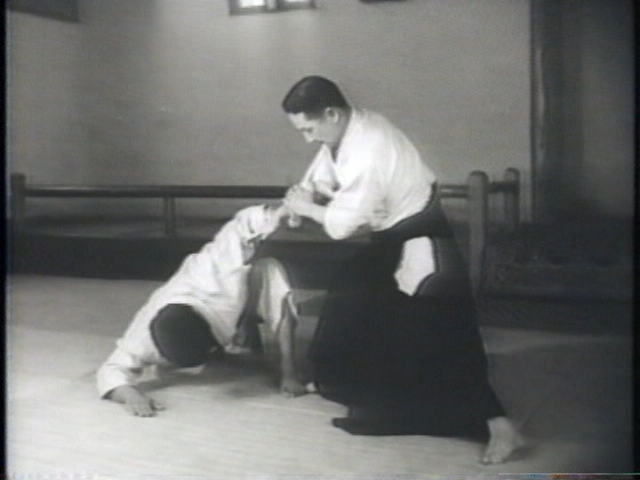

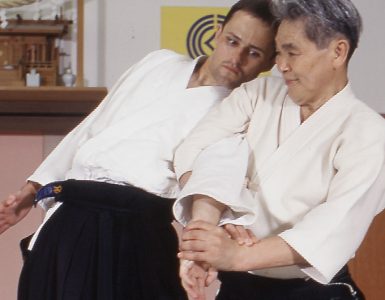
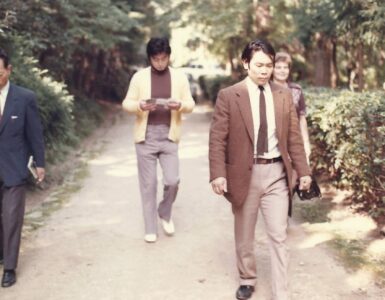
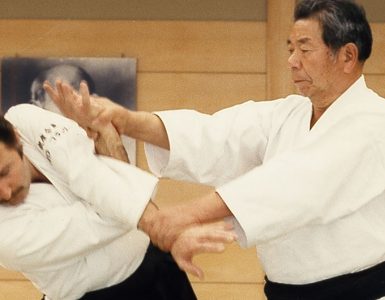







Add comment